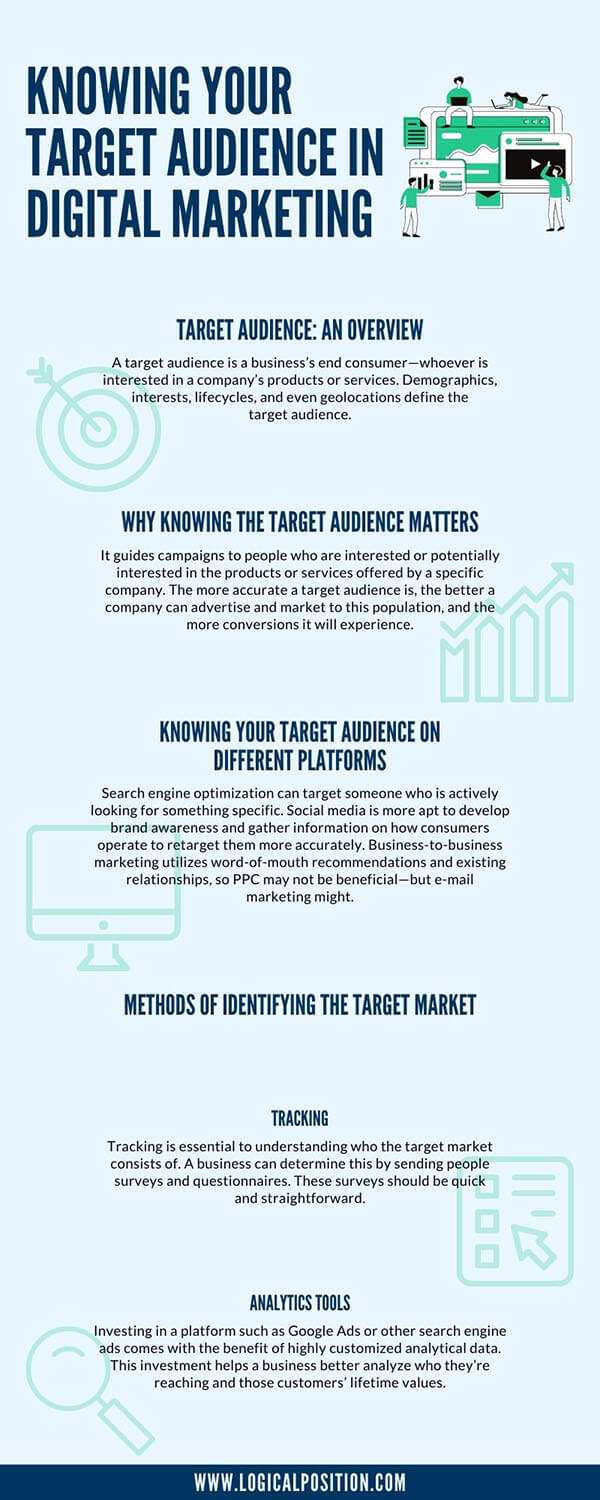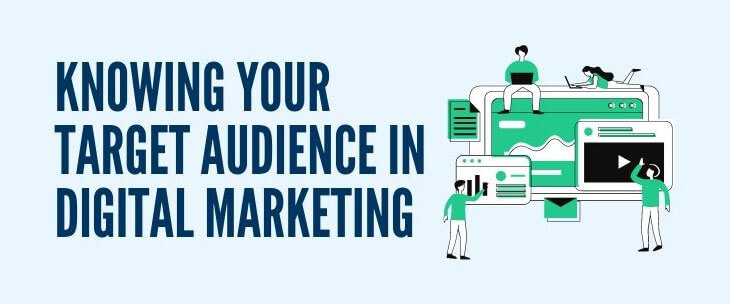Marketing is continuously shifting and evolving. There’s such a variety of marketing methods that companies often have trouble allocating funds to multiple channels, despite how crucial it is. In the past decade, marketing has significantly shifted toward the digital landscape. With this drastic shift and the continuously growing importance of digital marketing platforms, companies need to reflect these trends in their marketing plans. Digital marketing is the fastest and most direct way for a business to reach existing and potential customers.
When you’re creating a marketing plan, it’s essential to keep a few critical things in mind: your budget, your goals, and the methods for meeting those goals. One of the most important things for a successful marketing experience today is knowing your target audience in digital marketing. Marketing to the right target audience is essential for success in digital marketing campaigns.
Digital Marketing: An Overview
“Digital marketing” is a blanket term for all marketing methods on digital platforms. Every digital platform has different uses, audiences, and purposes and therefore must receive unique marketing materials and processes. Overall, digital marketing tries to reach a specific audience or consumer on a digital platform or in a digital manner. Below are a few of the most common digital platforms businesses can use for marketing.
Amazon
Digital marketing on Amazon is unique and comes with its challenges, but that’s not to say that managing a profitable marketing strategy on Amazon is impossible. Amazon can make its own rules and regulations as a platform. Advertisements cannot link out of the Amazon platform and must instead link to an Amazon store or Amazon product page. Because internal links are the only options for ads on Amazon, the platform is only useful in digital marketing if a business sells on Amazon.
Suppose a company does sell products on Amazon’s platform. In that case, it can benefit from various tools designed to segment a target market and place ads in beneficial locations to increase conversions. Something else that’s unique about the Amazon platform is that investing in pay-per-click (PPC) advertisements can raise organic search rankings simultaneously. The peculiarities with this platform mean that it is especially important to learn exactly how advertising on Amazon works in order to see success.
Facebook, Instagram, and Other Social Media Sites
Social media sites such as Facebook and Pinterest are all highly unique platforms. Each uses a unique algorithm to adjust and track impressions, engagement, and conversions. The Facebook umbrella contains popular subsites such as Instagram and Marketplace. These all work together with an algorithm that identifies when, where, and to whom to deliver a company’s ads across all smaller platforms under the umbrella.
Each social site appeals to a different demographic. Companies should fully understand how social media campaigns impact their business before selecting which social sites in which to invest ad spend. For younger demographics, sites such as TikTok and Snapchat may be the most direct routes. In comparison, older demographics are accessible on Facebook. Overall, the Facebook umbrella has the most extensive reach of all ages.
Google and Other Search Engines
Most people use Google or other search engines daily. Understanding how search engines work is essential to fully utilizing all the features and opportunities available to your business. There are multiple ways to target marketing using these search engines. There’s search engine optimization (SEO), which relies on your website, and pay-per-click (PPC) advertising, which is ad spend. Search engine optimization improves the organic search rankings of a business’s website through keywords, content, and development. SEO requires vigilant effort and takes time to develop, but it’s extremely useful in reaching people with high conversion potential.
Pay-per-click advertising on search engines increases the number of people who click into a website. These clicks have high conversion potential, but ultimately, conversions are determined by site design, development, and a consumer’s need for a product or service. Knowing how PPC campaigns work and successfully utilizing the many tools involved are key to seeing a great ROI with PPC.
Websites and Apps
Websites and apps are other digital platforms that companies can utilize for marketing. Websites and apps will often sell ad space to companies to reach their users. Apps and websites that sell advertising should provide an accurate and detailed description of their audiences so that companies can better segment their ideal audiences. These ads should get people back to the company websites quickly through intelligent creative.
Target Audience: An Overview
A business must first understand what a target audience is before it can determine its own target audience. A target audience is a business’s end consumer—whoever is interested in a company’s products or services. Demographics, interests, lifecycles, and even geolocations define the target audience. These are the people with the highest chance for conversion. Businesses need to target specific audiences to improve customer lifetime value and conversion rates. Knowing their target audiences helps companies tailor their messaging to incite purchases and bond consumers to their brands to develop loyalty and trust.
Why Knowing the Target Audience Matters
Knowing and understanding the target audience is one of the most important things in marketing. It guides campaigns to people who are interested or potentially interested in the products or services offered by a specific company. The more accurate a target audience is, the better a company can advertise and market to this population, and the more conversions it will experience.
Targeted marketing develops an understanding of a consumer’s behavior. Some people make impulse purchases, while others try to understand the purchase or justify it for a longer time before becoming a conversion. Understanding the interests and behavior of customers and potential customers allows businesses to better target them.
Knowing Your Target Audience on Different Platforms
Understanding a target audience in terms of specific platforms is essential to truly knowing your target audience. There are countless platforms to reach consumers in the digital sphere. Search engine optimization can target someone who is actively looking for something specific. Social media is more apt to develop brand awareness and gather information on how consumers operate to retarget them more accurately. Email marketing provides several ways to segment your audience to build an even better understanding.
Many companies don’t always search for services they want to go after. Business-to-business marketing utilizes word-of-mouth recommendations and existing relationships, so PPC may not be beneficial—but e-mail marketing might.
Without countless platforms available, it’s crucial to choose the right ones for your specific audience. Understanding who is interested in your products or services allows you to target them better and convert them.
Methods of Identifying the Target Market
Identifying the target market is the first step to developing an in-depth working knowledge of it. There are several different methods to accurately identify the target market for a business.
Tracking
Tracking is essential to understanding who the target market consists of. A business can determine this by sending people surveys and questionnaires. These surveys should be quick and straightforward. People will lose interest quickly, so keeping it to three or fewer questions and just a few clicks is ideal.
Analytics Tools
Using the different tools available on a marketing platform is another recommended way to identify a target audience. An example of this is Google Analytics. Google Analytics provides website owners with real-time data on keyword rankings, results, site speeds, retargeting data, and more. Investing in a platform such as Google Ads or other search engine ads comes with the benefit of highly customized analytical data. This investment helps a business better analyze who they’re reaching and those customers’ lifetime values.
When tracking, it’s critical to remember that tracking your audience’s moves online may be beneficial to you but off-putting for them. Striking a balance between law compliance, consumer trust, and accurate, helpful tracking is difficult but necessary.

Challenges in Target Audience Identification
There’s plenty of challenges when it comes to identifying target audiences, regardless of the platform used. A business owner can field and manage these challenges, but it may be difficult and time-consuming to stay on top of.
Laws
Laws surrounding digital marketing are continuously changing as governments and people develop a better understanding of privacy issues that come with tracking, data collection, and more. With law changes, a company must adapt its product or service marketing methods to comply while maintaining effectiveness.
Perception
The consensus among people is that data collection and tracking is creepy. People feel like they’re being followed online—because they are—and it makes them uncomfortable. Some monitoring is necessary, but doing too much data collection or analysis on your customers can deter them from your business. Catering to your customers’ interests and buying patterns is essential, but maintaining respect for their privacy is also crucial.
Inaccurate Data
Some analytical tools simply aren’t as advanced at data collection as others. Avoid using unknown metrics or relying on one platform for all data. This can lead to campaigns based on inaccurate or outdated data. Outdated data is difficult to maneuver, as data can change rapidly and be challenging to keep up with. Using multiple data sources to inform specific campaigns ensures your methods are as accurate as possible and not unintentionally biased.
Shared Devices
Shared devices are another challenge of tracking and identifying target markets. When people share devices, it can throw off tracking. An example is a family tablet. The data only knows this tablet as one user, but a parent and a few kids of differing ages could be using it at different times. This can get interests crossed and develop an inaccurate view of who this audience truly is. A young child may spend a lot of tablet time watching children’s videos and playing games, but a parent may be using it for work and research, thus creating a view of a tablet user that confuses most established algorithms.
A business can avoid this issue by not relying entirely on data. A well-versed professional in digital marketing knows how important it is to understand that as accurate as data can be, common sense and human scope are essential to interpreting it. Marketing decisions should be made by experienced people and informed by data rather than informed by data alone.
How a Digital Marketing Agency Helps with Target Audience Identification
A well-rounded digital marketing agency that takes a full-funnel approach can be invaluable to target audience identification. Agencies such as these can dedicate ample time and resources to fully understanding the needs, wants, and patterns of the real target audience for specific products and services of a particular company. Below are just a few of the advantages of working with professionals for target audience identification and campaign planning.
Interpretation of Data Through PPC, Ad Platforms, and Analytics Platforms
When all of a company’s digital marketing is with the same company, the agency can share analytical data through PPC within the Google Ads platform along with Google Analytics. Google Trends is also about to inform on geolocations and other hyper-specific demographic information. With all the data in one central location, the picture of the target audience can be much more precise.
Constant Testing
One of the major setbacks of trying to understand a target audience is a lack of accurate testing. Testing should be nearly constant, and adjustments should regularly happen to ensure the information is as precise and well-developed as possible. A professional digital marketing agency can do more research, studies, and searches on more key terms. They can look at the company’s customer analytics, such as account-based demographics, interests, platforms, and devices.
Everything works together. There are many advantages of knowing your target audience in digital marketing. The main benefit is accurately targeting the group that is most likely to convert. A digital marketing campaign’s success depends on the platform, the method, and proper identification of the target market. With a professional, dedicated digital marketing team, a business can achieve its full potential. Digital marketing increases impressions and conversions and helps companies reach their goals.
Discover what Logical Position can do for you. We are a digital marketing agency that understands the ways that different digital marketing platforms can inform each other and create a highly segmented target audience. Our departments work together to ensure your company reaches its full potential through our variety of digital marketing options. Contact us today to learn more and to receive a free consultation on any services for your business, including search engine optimization services.




